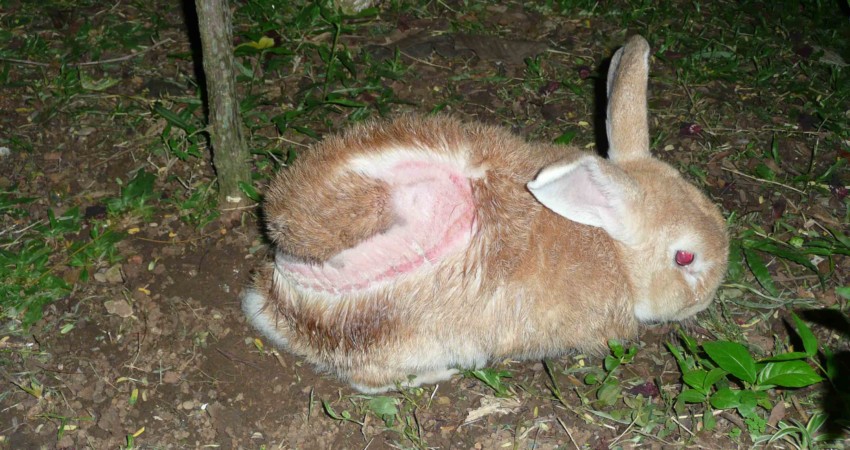

Ringworm is a skin disease that results from a fungus. There are multiple types of fungus that can lead to ringworm; the type seen most often that causes the condition in rabbits is Trichophyton mentagrophytes. Another fungus that leads to the disease in rabbits is Microsporum canis.Also known as dermatophytosis and dermatomycosis, ringworm is a skin disease that results from fungus and leads to areas of hair loss in a rabbit.
Should your rabbit have ringworm, you will typically see dry, scaly, patchy areas of hair loss. In many cases the lesions your rabbit is experiencing will first be present on his head, legs, and feet. The lesions then may spread to other parts of their body and can turn reddish in color. Often these areas will be itchy. Scratching these areas can cause more skin trauma and lead to secondary bacterial infection. Reddish lesions Hair loss Dry, scaly patches on skin
Ringworm is caused by a fungus; spores from animals infected with ringworm can be cast into their environment where they can live for more than 18 months. In some cases, rabbits may not show symptoms of ringworm but be carrying the spores. These rabbits than shed the spores and the environment will be contaminated, leading to possible infection in other rabbits.
Transmission can take place as a result of interacting with a rabbit that has been infected with the spores or through contact with something in the environment that has been tainted with spores (for example, bedding, brush). Animals will be more likely to develop ringworm if they are living in overcrowded conditions, in areas with high humidity, where there is poor sanitation, or where they are not receiving good nutrition.
The majority of rabbits that are infected with ringworm will recover without any treatment as long as any factors with their nutrition and environment are resolved. Should your rabbit have isolated lesions, your veterinarian may clip his fur down close to the skin in the area next to the lesion. It is important to not irritate your rabbit’s skin because this could cause the spread of the infection. Any instruments used for grooming will need to be sterilized so has to not pass on spores to another rabbit.Your veterinarian will consider treatment based on the severity of the lesions on your rabbit. Options include:- Keratolytic- Miconazole- shampoos- Lime sulfur dips- Topical anti-fungal medications (miconazole or clotrimazole cream)- Oral medications to include: Griseofulvin (not to be used on pregnant or animals that are breeding) and Itraconazole
Treatments will continue for a minimum of two weeks after the lesions on your rabbit have healed or once there have been two cultures that are negative for fungus. Ringworm fungus is able to survive for a very long time, therefore it is important that the environment of your rabbit be thoroughly cleaned.Recovery of Ringworm in Rabbits In addition to treating your rabbit, it will be important to treat his environment. Since the fungal spores are resistant to many cleaners, it is recommended that when cleaning your rabbit’s environment that you use bleach diluted to 1:10 with water or enilconazole (0.2%). All tools used for grooming, bedding, kennels, etc. should also be cleaned and disinfected.
In addition, carpets and ducts should be vacuumed and their filters replaced. It will be important to vacuum any curtains and home furnishings and dispose of the contents in the vacuum immediately. This level of cleaning should be done throughout your rabbit’s recovery, and for a few weeks upon the treatment’s completion. You will also want to wash your own clothes in order to ensure that spores are not surviving on your personal items and able to be passed back to your rabbit. As ringworm can be transferred to humans, particularly those with a suppressed immune system, it is important that you wear gloves during interactions with your rabbit while he is undergoing treatment.
 Contact Jaguza Support
Contact Jaguza Support